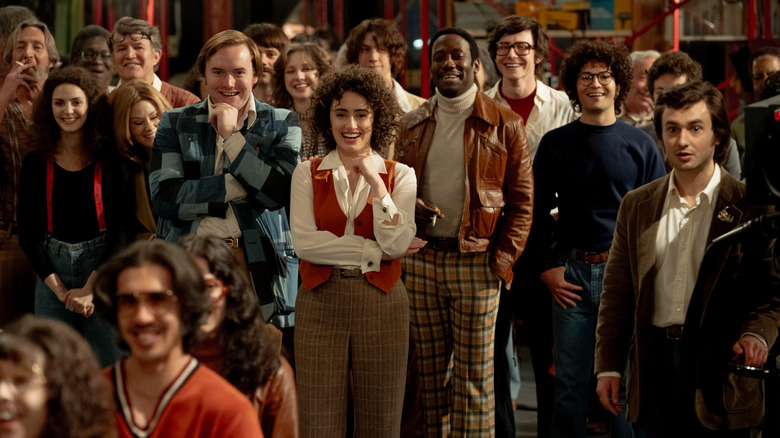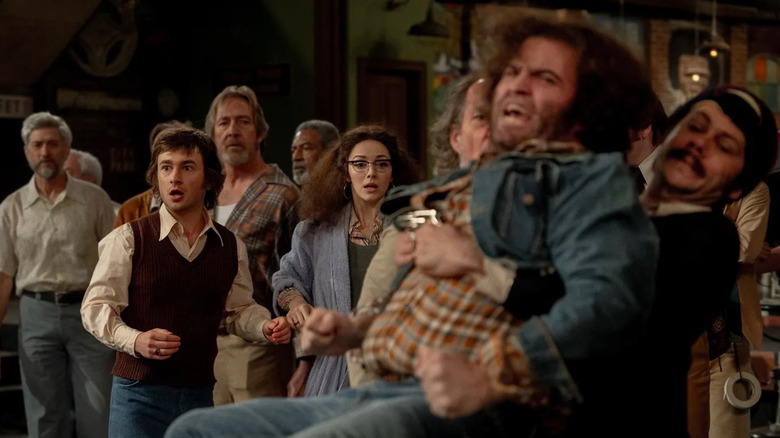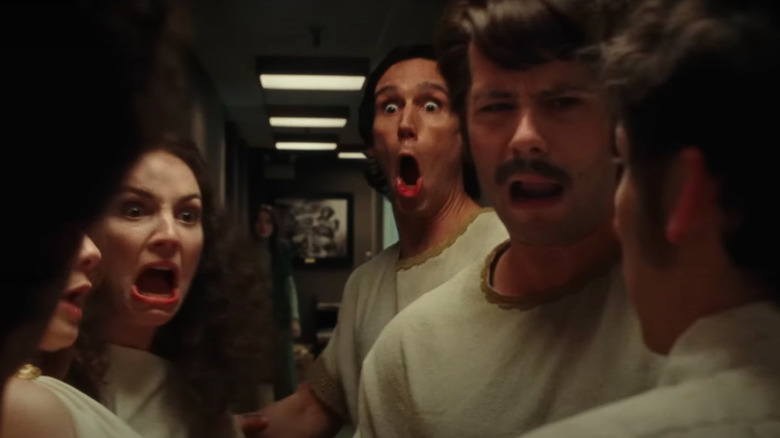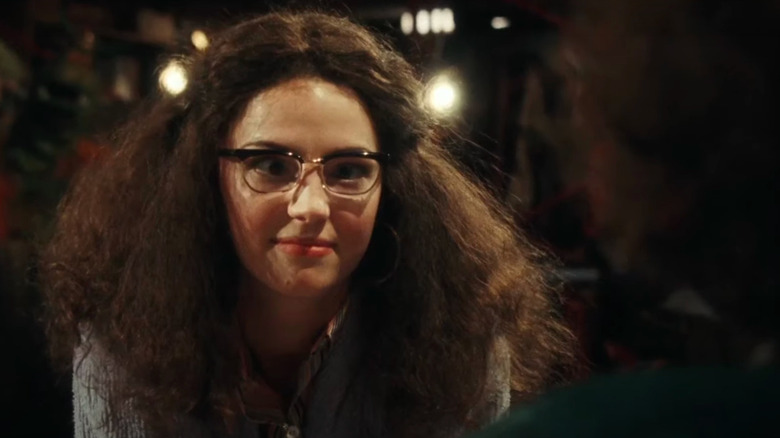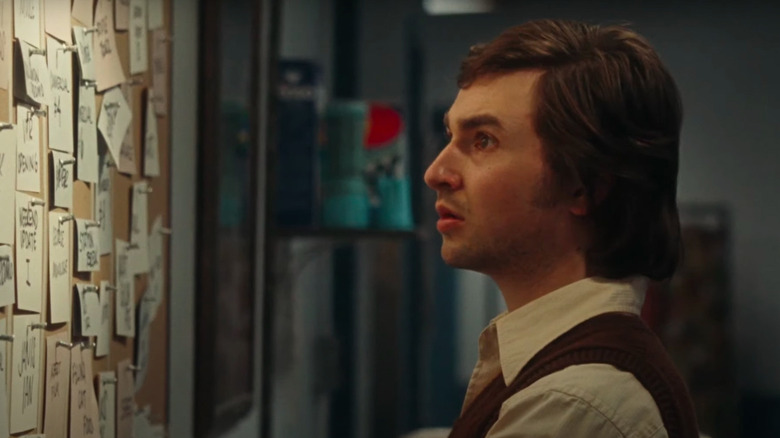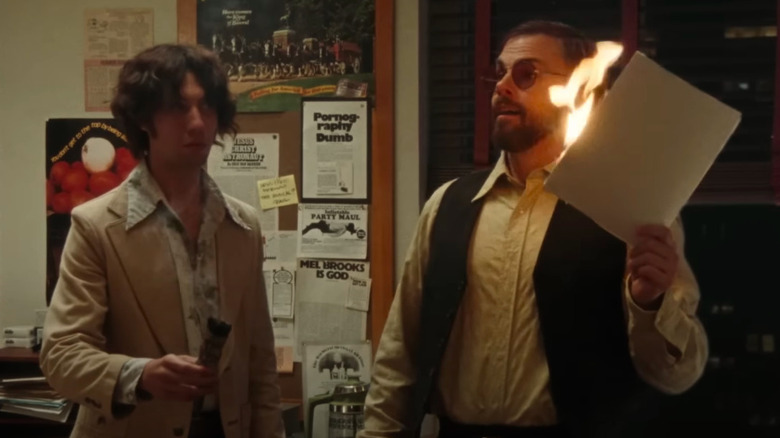Saturday Night Review: Jason Reitman Creates A Crackling Chronicle Of A Comedy Cornerstone
In 2021, "Up in the Air" and "Juno" director Jason Reitman dug into the legacy of his filmmaking father Ivan Reitman with "Ghostbusters: Afterlife," a revival of the sci-fi comedy franchise with a refreshing yet overly nostalgic lens. Now, he's reaching back to the rise of a pillar of American comedy by way of one of the "Ghostbusters" creators and the troupe of comedians and innovators who made showbiz history back in 1975.
"Saturday Night" moves like a bullet train as it chronicles the incredibly intense, mystifyingly disorganized, and utterly chaotic 90 minutes that led up to the premiere of the first episode of the NBC sketch comedy series that was eventually given the moniker of "Saturday Night Live" (you can find out why it didn't have that title from the get-go over here). Spearheaded by showrunner Lorne Michaels (played by "The Fabelmans" star Gabriel LaBelle), the project was a counterculture sketch comedy series starring an ensemble of unknown twenty-something comedians, all of whom would go on to become some of the biggest names in comedy. But at 10pm on the night of October 11, 1975, they were all practically nobodies, marching toward showtime without finalized scripts, and one of them hadn't even signed the network contract to star in the show.
Not unlike "Ghostbusters: Afterlife," there's plenty of nostalgia at play in "Saturday Night," so much that general audiences without a passing knowledge of the history of "SNL" might find themselves a bit lost in the erratic shuffle or missing amusing bits. But the difference is that "Saturday Night" comes armed with a witty, fast-talking script, meticulously precise camera work, a funky, ticking score by Jon Batiste (who also plays musical guest Billy Preston), and a massive, pitch-perfect ensemble that makes the nostalgia a bonus feature rather than the driving force. Sure, "Saturday Night" still very much operates as a full-on love letter to "SNL," with a masterful recreation of the stages of Studio 8H and many of the signature sketches that made the premiere so memorable. But it's the behind-the-scenes drama and interplay between all the moving pieces that make this a compelling, richly drawn portrait of a milestone moment in showbiz history.
Gabriel LaBelle is fantastic as Lorne Michaels
The lenses of "Saturday Night" — often wandering throughout an incredible copy of the Studio 8H maze, captured on 16mm film — highlights all the confusion and hot-headed exchanges in front of and behind the camera. That means that the focus is always shifting around the madness, whipping left and right and pausing only for a handful of quieter, significant conversations between key players when cinematographer Eric Steelberg isn't pulling off masterful long-takes worthy of Paul Thomas Anderson. But there's a charming center to "Saturday Night."
Gabriel LaBelle proves that "The Fabelmans" wasn't a fluke, and he's got the charisma to make Lorne Michaels confident without being overly cocky as he takes the spotlight throughout most of "Saturday Night." Most importantly, LaBelle also has no problem exhaling an air of insecurity and uncertainty when he's not forced to put on the fake-it-til-you-make-it-face and giving the illusion of knowing exactly how he's going to make this hot mess of a show come together in time to air. LaBelle makes you believe that Michaels is going to pull this off, and while he benefits from real history letting us know that he will, "Saturday Night" makes the show's production look so hectic and unorganized that you almost believe there's a chance it's not going to work.
In one of the more key supporting roles, Cooper Hoffman ("Licorice Pizza") plays NBC executive Dick Ebersol, who acts as the rational center of the show, trying to wrangle Michaels into realizing that he needs to define exactly what the show is sometime before they go live in 90 minutes, even going so far as to try to get them more advertising money by bringing the then-new Polaroid camera into a sketch. Michaels himself doesn't seem to be easily able to explain the show to anyone, but again LaBelle makes it seem like he knows somewhere deep in his bones, even if he doesn't have the words. Did Michaels himself even really know at the time? Only he could say for sure.
Then there's Rachel Sennott ("Bottoms") as writer Rosie Shuster, who was married to Lorne Michaels at the time, but the movie only briefly touches upon the peculiar marriage that seemed to be more open-ended than happily ever after, as Shuster once says, "We may be married, but I'm not your wife." It adds a tinge of romantic complication to the equation, but not enough to ever take center stage or offer anything significant thematically. It's just another shaky cog in the unstable machine that is this haywire production. Sennott's role is the most fully drawn female character — which is unfortunate when you have such a talented ensemble playing some of the most gifted comedians of the era lingering elsewhere in the movie — but she still charms with a smaller part, acting as one of the few who succeeds as a talent whisperer, especially when it comes to saddling the unpredictable and increasingly frustrated John Belushi (a superb Matt Wood), who still hasn't signed his NBC contract. However, he's hardly the most prominently featured cast member from the show.
The Not Ready for Primetime Players are perfectly portrayed
When it comes to the rest of the Not Ready for Primetime Players, almost all of them get a chance to shine. Cory Michael Smith captures the arrogance and dry wit of the infamously rude Chevy Chase, and Dylan O'Brien manages to exude both the sex appeal and quirkiness of young Dan Aykroyd, not to mention showing a surprisingly insecure side of the comedian. Lamorne Morris stands out as Garrett Morris, the only Black cast member of the show, as he starts to wonder exactly why he's there, when he's not exactly given a lot to do.
Matt Wood always seems to be teetering on the edge of a rage-filled breakdown as he unleashes the tortured artist side of the legendary John Belushi. They all have both introspective and hilarious moments tied to their history and legacy on the show. That's especially true for Chevy Chase, who gets into a shocking scuffle with Milton Berle (a scene-stealing J.K. Simmons), a moment conflated into the story despite not actually happening on premiere night (there are a few other inconsistencies heightened for entertainment, but they all serve the spirit of "SNL" and the lunacy that would continue long after the first show).
Unfortunately, Ella Hunt, Emily Fairn, and Kim Matula get the somewhat short end of the stick as Gilda Radner, Laraine Newman, and Jane Curtin. It's not because of their performances, as each of them manages to inhabit the spirit of these women with flying colors. While they each have a small moment to stand out, the rest of the movie is so overrun with the showbiz insanity that the movie simply doesn't have the runtime to allow everyone significant screentime or development. Though there's time for Billy Crystal (a notable performance by Nicholas Podany) to have a runner throughout the movie, as he was famously cut out of the first episode of "SNL."
The ladies get short-changed a bit, but...
But Reitman, with the help of editors Nathan Orloff and Shane Reid, do find little moments to provide a more meat for their appearances. For example, Newman always seems to be looking longingly with concern when Aykroyd is playfully flirting with the other female cast members, and she's also dedicated to getting a certain seemingly impossible costume change just right. Radner is a bright light of energy in every scene, and one particular reflective moment gives her a solid emotional center that adds a bittersweet perspective to the overall experience of making what would become a beloved show, especially for those who know the fate that awaits the star who left us far too soon. Finally, Curtin has a key conversation with Morris reflecting on the trajectory of her career, from a commercial actor to this hopeful breakout role. It's a shame that the women end up not being given more to play with, but the trio is certainly having fun, especially when the time comes for their female construction worker set where they ogle Dan Aykroyd in cutoff jean shorts and a tank top.
However, across the board, it should be noted that each and every cast member is absolutely fantastic in their role. They all manage to inhabit each comedian by replicating their voice and persona without laying it on thick. Their performances are authentic and genuine, each managing to capture the likeness of their real life counterparts by doing understated impersonations that don't feel like cardboard cutouts. Even Nicholas Braun's dual roles as Muppets creator Jim Henson and oddball comedian Andy Kaufman (both serving as hilarious runners throughout the film) manage to capture the idiosyncrasies of these real-life legends. The only one who doesn't seem like he has much bubbling deeper than the surface is Chevy Chase, but that feels like a testament to how good Cory Michael Smith is at portraying the famously arrogant comic who was out to serve only himself.
First and foremost, this is about SNL
But as much as "Saturday Night" is about the sketch series that will become "SNL," it's not about the stars who bring it to life in front of the camera. It's about what happens behind the scenes, including all the tense conversations that Michaels has to have about getting the show on the air. Willem Dafoe observes every single misstep as an intimidating foe in the form of NBC's head of talent David Tebet, though it should be noted this adversarial relationship has been mostly manufactured for the movie, as Tebet was actually a supporter of the series. But you can't deny that it's mesmerizing to have Dafoe leering and sneering at Michaels from behind sunglasses as the showrunner purports to be in control of this frenzied production, even as he's literally locked out the actual control room.
While some might see the show's rebellious attitude and impending success as being celebrated too fiercely by putting Michaels on a bigger pedestal that has already been built sky high over 50 years of television that reaches well-beyond "SNL," Michaels' eventual triumph is the point. The movie isn't digging too deep into Michaels as a character beyond his efforts to turn this show into something groundbreaking. That can be a little frustrating, but when the movie unfolds across just 90 minutes on a single night, we're not going to get any life-defining revelations. After all, the movie is called "Saturday Night," not "The Life and Times of Lorne Michaels."
One of the best movies of the year
"Saturday Night" sizzles with witty barbs and insults, calling back to a completely different time in television. While it could be argued that "Saturday Night" feels more like a hagiography that merely prints the legend, the embellishment and conflation of certain events and details should be expected in movies like this, and there's plenty of credit to be given where it is due. What matters is that the movie captures the spirit of the groundbreaking TV show, even if it's not necessarily doing anything revolutionary in the process.
Though today's "SNL" isn't quite so innovative or bold in its satire, which has likely made the defiant and turbulent writer Michael O'Donoghue (a hilariously wry and stern performance by Tommy Dewey) turn in his grave several times over, the show as portrayed on "Saturday Night" still has sharp, unwieldy teeth, so much that no one hesitates to pull one over on the intrusive woman from NBC's standards and practices department who keeps editing the unfinished sketch scripts. This is the kind of show where O'Donoghue doesn't hesitate to tell host George Carlin (an exceptional but underutilized Matthew Rhys) that he's basically a poor man's Lenny Bruce (in so many words). It's rowdy, it's messy, it's Saturday night.
Like any given episode of "SNL," Jason Reitman's "Saturday Night" is not perfect; there are highs and lows, and the cast just might be too big to adequately hit all the finer points in a satisfying way. But the outcome is an ultimately satisfying showbiz romp with equal parts comedy and drama that is full of effervescent life, outstanding performances, and a wealth of laugh-out-loud moments. Even acknowledging its shortcomings, "Saturday Night" is hands down spectacular, and it's easily one of the best movies of the year.
/Film Rating: 9 out of 10
"Saturday Night" opens September 27, 2024 in LA, NY, and Toronto before a limited release on October 4, 2024 followed by an October 11, 2024 wide release.
